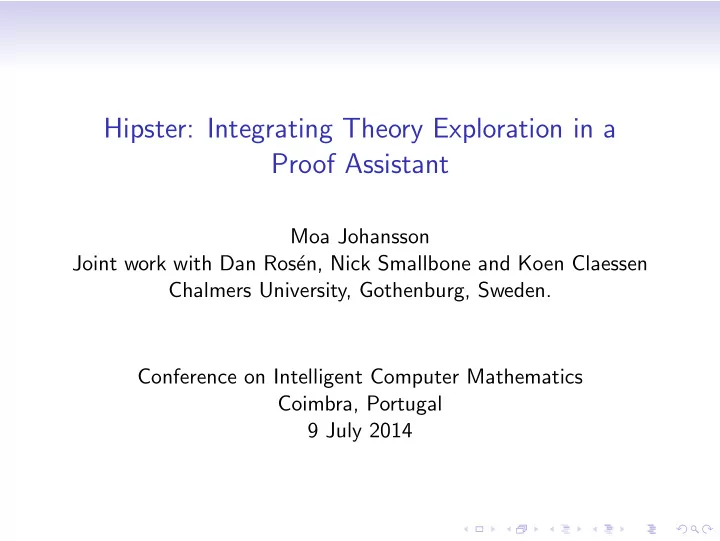

Hipster: Integrating Theory Exploration in a Proof Assistant Moa Johansson Joint work with Dan Ros´ en, Nick Smallbone and Koen Claessen Chalmers University, Gothenburg, Sweden. Conference on Intelligent Computer Mathematics Coimbra, Portugal 9 July 2014
Introduction: Theory Exploration Theory Exploration Paradigm [Buchberger-2000]: • Theorems not proved in isolation. • Rather, explore whole theories: • Prove routine lemmas. • Proceed to more complex theorems. • Possibly backtrack and prove more lemmas. • New theories on top of old ones. • Interactive theorem proving: • Creative/hard steps left to user.
Introduction: Theory Exploration Theory Exploration Paradigm [Buchberger-2000]: • Theorems not proved in isolation. • Rather, explore whole theories: • Prove routine lemmas. • Proceed to more complex theorems. • Possibly backtrack and prove more lemmas. • New theories on top of old ones. • Interactive theorem proving: • Creative/hard steps left to user. Our work: Automatically discover new and interesting lemmas in inductive theories.
Inductive Theorem Proving and Theory Exploration Example Domain: Proofs by induction • Often need lemmas (also needing induction). • Hard to find automatically, e.g. generalisations. • Bottom-up approach: Create richer background theory first.
Inductive Theorem Proving and Theory Exploration Example Domain: Proofs by induction • Often need lemmas (also needing induction). • Hard to find automatically, e.g. generalisations. • Bottom-up approach: Create richer background theory first. Background: HipSpec • Inductive prover for Haskell. • Generate (equational) conjectures. Tested, not proved. • Apply induction, then call off the shelf FO-provers.
Hipster: Theory Exploration for Isabelle/HOL • Translate Isabelle/HOL theory to Haskell. • Use conjecture generation from HipSpec. • Currently only equational conjectures. • Prove in Isabelle (LCF-style). • Keep interesting theorems (need induction). • Discard if trivial proof.
Hipster: Theory Exploration for Isabelle/HOL • Translate Isabelle/HOL theory to Haskell. • Use conjecture generation from HipSpec. • Currently only equational conjectures. • Prove in Isabelle (LCF-style). • Keep interesting theorems (need induction). • Discard if trivial proof. Demo: Exploring a theory about binary trees
Hipster: Overview Isabelle Haskell theory Program Code generator Theorems Proved Theory Difficult Routine Conjectures exploration reasoning reasoning Failed Trivially proved? Discard
Conjecture Generation in Haskell • Set of functions and variables . • All type-correct terms up to given depth. • Testing (many) random ground instances. • Evaluate and divide equivalence classes.
Conjecture Generation in Haskell • Set of functions and variables . • All type-correct terms up to given depth. • Testing (many) random ground instances. • Evaluate and divide equivalence classes. Example: xs �→ [] , ys �→ [a] , zs �→ [b] Term Ground Instance Value (xs @ ys) @ zs xs @ (ys @ zs) xs @ [] xs
Conjecture Generation in Haskell • Set of functions and variables . • All type-correct terms up to given depth. • Testing (many) random ground instances. • Evaluate and divide into equivalence classes. Example: xs �→ [] , ys �→ [a] , zs �→ [b] Term Ground Instance Value (xs @ ys) @ zs ([] @ [a]) @ [b] xs @ (ys @ zs) [] @ ([a] @ [b]) xs @ [] [] @ [] xs []
Conjecture Generation in Haskell • Set of functions and variables . • All type-correct terms up to given depth. • Testing (many) random ground instances. • Evaluate and divide into equivalence classes. Example: xs �→ [] , ys �→ [a] , zs �→ [b] Term Ground Instance Value (xs @ ys) @ zs ([] @ [a]) @ [b] [a,b] xs @ (ys @ zs) [] @ ([a] @ [b]) [a,b] xs @ [] [] @ [] [] xs [] []
Ongoing and Further Work • Experiments with different tactics for hard/routine reasoning. • Conditional lemmas: • Given a side condition, generate lemmas. • E.g. sorted(xs) ==> sorted(insert x xs)
Conclusion • Automatically find and prove routine lemmas. • LCF-style re-checkable proofs. • Incremental exploration, store lemmas in libraries. • User can control search space. • Lemmas enhance automated tactics, e.g. Sledgehammer.
Recommend
More recommend